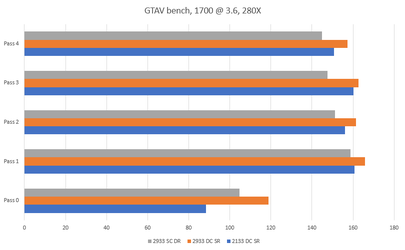- Joined
- Mar 7, 2008
I just did the following testing, which came about due to an interesting question on another forum. A member was looking for ram configuration advice on a Ryzen build. My instinct was to go for bandwidth in the form of dual channel, but another member proposed that fabric speed was more important. Ideally, you could have both, but the OP was only getting a 2 slot board and couldn't afford all the ram in one go.

This is the built in benchmark, which gives min/max/average for 5 passes. Shown above are the averages. I tested in 3 ram configurations.
Test system:
CPU: Ryzen 1700 fixed at 3600 MHz 1.20v.
Mobo: Asus Prime X370 Pro bios 0805
Ram: Corsair Vengeance LPX 3000 2x4GB
GPU: 280X with bios mod to run at AMD stock clock/voltage. Factory OC didn't add more performance but did take silly amounts of power.
Firstly, ram set to 2133 dual channel, single rank. Modules were in slots 2 and 4, counting 1 as closest to CPU. I turned on DOCP and the ram was then running at 2933. Past testing showed it was unstable at the next step of 3066. Now I wanted to run both modules in single channel, to keep the same amount of ram. On Intel I'd just slots 1 and 4, but when I booted I saw CPU-Z still report it was running in dual channel mode. Fine, I moved the modules to slots 3 and 4. Now it was reporting single channel, but in this case, note there is 2 rank per channel. That can also affect performance compared to single rank per channel. Past testing on Intel with synthetic benchmarks show a slight increase in bandwidth and also a slight increase in latency. I haven't looked at Ryzen in the same way.
Anyway... the chart shows that dual channel at 2933 was fastest in all cases. Not surprising. Now, is single channel at 2933 faster than 2133 dual channel? In 4 of the 5 passes, 2133 dual channel was faster than 2933 single channel. Differences were relatively small. In the remaining case of pass 0, 2933 single channel was a fair bit faster than 2133 dual channel.
Conclusion, dual channel at high speed is best, but it could go either way to bandwidth or fabric speed in other cases. It will likely be sensitive to the load so it will be hard to generalise these GTAV results to other applications.

This is the built in benchmark, which gives min/max/average for 5 passes. Shown above are the averages. I tested in 3 ram configurations.
Test system:
CPU: Ryzen 1700 fixed at 3600 MHz 1.20v.
Mobo: Asus Prime X370 Pro bios 0805
Ram: Corsair Vengeance LPX 3000 2x4GB
GPU: 280X with bios mod to run at AMD stock clock/voltage. Factory OC didn't add more performance but did take silly amounts of power.
Firstly, ram set to 2133 dual channel, single rank. Modules were in slots 2 and 4, counting 1 as closest to CPU. I turned on DOCP and the ram was then running at 2933. Past testing showed it was unstable at the next step of 3066. Now I wanted to run both modules in single channel, to keep the same amount of ram. On Intel I'd just slots 1 and 4, but when I booted I saw CPU-Z still report it was running in dual channel mode. Fine, I moved the modules to slots 3 and 4. Now it was reporting single channel, but in this case, note there is 2 rank per channel. That can also affect performance compared to single rank per channel. Past testing on Intel with synthetic benchmarks show a slight increase in bandwidth and also a slight increase in latency. I haven't looked at Ryzen in the same way.
Anyway... the chart shows that dual channel at 2933 was fastest in all cases. Not surprising. Now, is single channel at 2933 faster than 2133 dual channel? In 4 of the 5 passes, 2133 dual channel was faster than 2933 single channel. Differences were relatively small. In the remaining case of pass 0, 2933 single channel was a fair bit faster than 2133 dual channel.
Conclusion, dual channel at high speed is best, but it could go either way to bandwidth or fabric speed in other cases. It will likely be sensitive to the load so it will be hard to generalise these GTAV results to other applications.
Last edited: